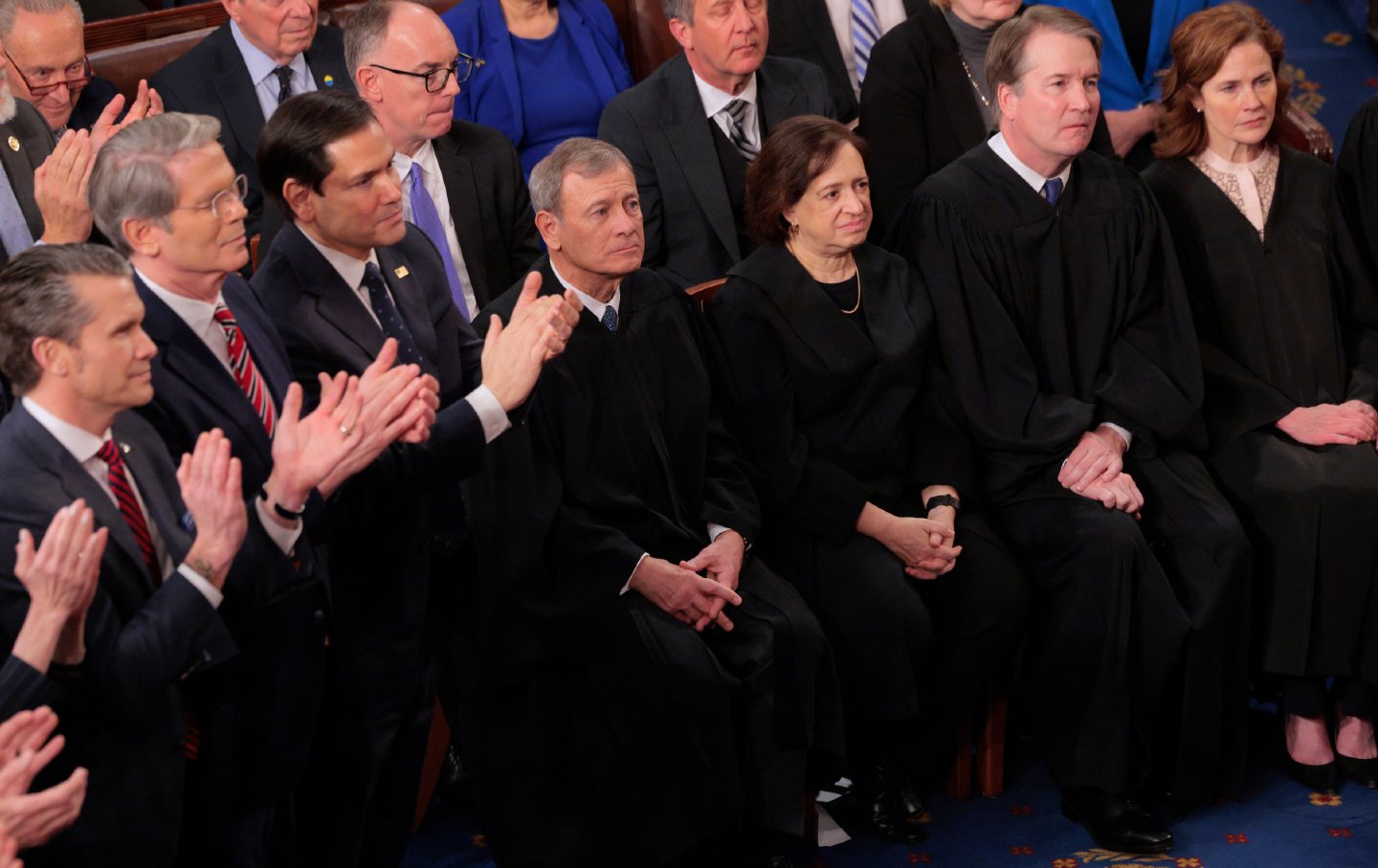The House of Representatives Rules That Anti-Zionism Is Antisemitism
After a more than four-hour hearing of the House Education and Workforce committee, the resolution passed, with only 14 votes against it.

Representative Virginia Foxx (R-N.C.), committee chair, right, and Representative Bobby Scott (D-VA), committee ranking member, left, listen to testimony during a House Education and Workforce Committee Hearing on antisemitism at the US Capitol on Tuesday, December 5, 2023.
(Graeme Sloan / Sipa USA / AP Images)The House of Representatives seemed to achieve its summit of cynical grandstanding today, with debate over a resolution proclaiming that anti-Zionism is antisemitism. That measure is not only a kind of photographic negative of the 1975 UN resolution condemning Zionism as racism (revoked in 2019); it also is founded on the antisemitic equation of Zionist sentiment with Jewish identity, even though many Orthodox Jews, and secular dissenters, remain opposed to Zionism. New York Democratic Representative Jerry Nadler raised that crucial objection, among others, in an impassioned dissent to the resolution, but as Nadler spoke on Monday night, the measure was on track to be endorsed in a lopsided majority vote—not least because its language leaves ample room for anyone voting “no” to be branded an antisemite. Sure enough, the resolution passed by a resounding 311-14 margin, with 92 representatives voting “present.”
As a kind of calisthenic warm-up for that pending floor vote, the House Education and Workforce committee conducted a marathon hearing on the spread of antisemitism on American college campuses—in part, no doubt, because the long-running right-wing culture war on the American university is such an inviting rhetorical proving ground. This is not to deny that antisemitic rhetoric and harassment aren’t distressingly apparent on many college campuses, and that universities should do more to ensure the safety and well-being of Jewish students. But it is to note that reckoning with these issues entails a good deal more than enlisting a trio of elite university presidents as ideological foils for future electioneering, which was the clear objective of the panel’s inquiry. The game was given away in the committee’s own advance news release; the title of the hearing was “Holding Campus Leaders Accountable and Confronting Antisemitism” but the document bore the red-meat sobriquet “College Presidents to Answer for Mishandling of Antisemitic, Violent Protests.”
The same rhetoric opened the committee’s proceedings, as committee Chair Virginia Foxx of North Carolina—whose last tour of media renown occurred when she graciously yelled “Shut up!” to a reporter questioning newly appointed House Speaker Mike Johnson on his election-denying record—sternly lectured the committee’s witnesses on the “moral rot” and “poisonous fruits” of their agenda of curricular subversion. Diversity, equity, and inclusion divisions were rapidly namechecked, as were course offerings that mentioned settler colonialism in the context of the Middle East. And true to reactionary form, she threw an obligatory “social justice” into the bargain. “This moment is an inflection point,” she concluded. “It demands leaders of moral clarity with the courage to delineate good from evil, and right from wrong.”
The other key culture-war tell was that the university leaders in question—Presidents M. Elizabeth Magill of Pennsylvania University, Claudine Gay of Harvard, and Sally Korntbluth of MIT—all represented elite private institutions, far afield from the debt-strapped, vocationally minded instruction that prevails in most public universities and community colleges. This status means that these privileged institutions aren’t bound by stricter directives to abide by First Amendment speech protections in public schools. But more important for the panel’s GOP majority, Ivied university officials are open-season quarry in the culture wars—terminally out of touch, privileged, and besotted with fashionable academic and administrative jargon that can be made to look like appeasement or collaboration in the face of any number of civilizational threats. (Another witness for the committee, American University historian Pamela Nadell, didn’t serve as such a ready-made villain, in part because she kept reminding her questioners that antisemitism was a long-standing malady in America, and far from a monopoly left-wing franchise.)
The assembled college brass didn’t really supply much in the way of attack-ad fodder for the right. They all forcefully and properly denounced the horrific and brutal attacks that Hamas perpetrated on Israeli civilians on October 7. They all rightfully denounced antisemitism as a form of race hatred that had no place in their schools, and explained that they were taking measures, usually in the form of increased policing, to ensure the safety of Jewish students singled out for bigoted attacks on campus.
So Republican members, following Foxx’s lead, set about trying to demonstrate that universities are warrens of fifth columnist Hamas sympathizers. After pressing the school presidents on the percentage of faculty in their schools identifying as conservative—numbers that all quite properly replied that they didn’t track—South Representative Joe Wilson (whose own Foxx-like moment of press notoriety came when he bellowed, “You lie!” to President Barack Obama at his 2009 address on before the joint chambers of Congress) darkly warned that “the rise of antisemitism is due to an illberalism that’s taken over the country. And you might bear that in mind when you get your next government grant.”
Other members eagerly took up the same inquisitorial line. New York Representative Elise Stefanik demanded that Gay report whether any students who had taken up chants calling for a renewed intifada or using the phrase “from the river to the sea” would have their admissions rescinded. Georgia Representative Rick Allen wanted assurance from Gay that she would suspend foreign students who had broken the law. (Allen, who’d prefaced this query with a quotation from Proverbs 9:10 about how the fear of God is the getting of wisdom, used his five minutes of speaking time to denounce “biblical illiteracy” and to invoke at length the passage from Genesis beloved among extremist Christian Zionists holding that all whom are blessed by Israel will be blessed by God, a key item of prophecy intoned by antisemitic preachers like John Hagee.)
If it sounds odd for so many right-wing critics of the American university, long inured to decrying speech codes and political correctness as grave trespasses against the First Amendment and free inquiry, calling for the expulsion of students and faculty on grounds of selective thoughtcrime, well, this is now simply mainstream Republican orthodoxy. Donald Trump made a great show, after all, of decrying political correctness in his first presidential run, and is now openly plotting to use the power of the state, should he be returned to office, to punish political enemies, harass journalists, and continue carrying out the right-wing takeover of public education. Besides, Trump’s House acolytes were armed with a key talking point: the Foundation for Individual Rights and Expression had bestowed on Harvard the lowest score in its annual collegiate free-speech rankings, with Penn in the second-lowest position. So as the three presidents all did their best to spell out the difficult, actual balancing act that they sought to strike between free inquiry and abusive speech, their GOP inquisitors trotted out the FIRE ranking as yet another variation of the great culture-war taunt, “I know you are, but what am I?”
That is, they would have, had they allowed their witnesses to reply in full. More often, questioners like Stefanik—whom other GOP members repeatedly graced with the balance of their questioning time—would start to ask incendiary questions about pro-Hamas genocidal rhetoric or insufficient crackdowns on it, demand an immediate yes-or-no reply, and shout over the replies-in-process, declaring them either a nonresponse or a no. Footage of the hearings should come with a clear trigger warning for any American educators seeking to instill critical thinking via the Socratic method or other modes of open-ended discourse.
More than four hours into the proceedings, the committee was gaveled into recess. The members had to attend to floor votes—including the main event, the anti-Zionism-as-antisemitism resolution. The hearing would rumble on, but Virginia Foxx’s work here was clearly done—and as Presidents Gay, Magill, and Kornbluth understood all too well by that point, anyone thinking otherwise could just shut up.
Hold the powerful to account by supporting The Nation
The chaos and cruelty of the Trump administration reaches new lows each week.
Trump’s catastrophic “Liberation Day” has wreaked havoc on the world economy and set up yet another constitutional crisis at home. Plainclothes officers continue to abduct university students off the streets. So-called “enemy aliens” are flown abroad to a mega prison against the orders of the courts. And Signalgate promises to be the first of many incompetence scandals that expose the brutal violence at the core of the American empire.
At a time when elite universities, powerful law firms, and influential media outlets are capitulating to Trump’s intimidation, The Nation is more determined than ever before to hold the powerful to account.
In just the last month, we’ve published reporting on how Trump outsources his mass deportation agenda to other countries, exposed the administration’s appeal to obscure laws to carry out its repressive agenda, and amplified the voices of brave student activists targeted by universities.
We also continue to tell the stories of those who fight back against Trump and Musk, whether on the streets in growing protest movements, in town halls across the country, or in critical state elections—like Wisconsin’s recent state Supreme Court race—that provide a model for resisting Trumpism and prove that Musk can’t buy our democracy.
This is the journalism that matters in 2025. But we can’t do this without you. As a reader-supported publication, we rely on the support of generous donors. Please, help make our essential independent journalism possible with a donation today.
In solidarity,
The Editors
The Nation








